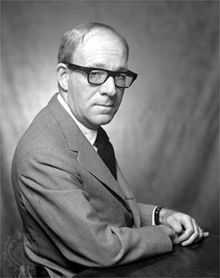Howard Moss

Howard Moss (January 22, 1922 – September 16, 1987) was an American poet, dramatist and critic. He was poetry editor of The New Yorker magazine from 1948 until his death and he won the National Book Award in 1972 for Selected Poems.[1]
Biography
Moss was born in New York City. He attended the University of Michigan, where he won a Hopwood Award. He is credited with discovering a number of major American poets, including Anne Sexton and Amy Clampitt.
W. H. Auden and Chester Kallman co-wrote a famously concise clerihew in his honor:
- TO THE POETRY EDITOR OF THE NEW YORKER
Is Robert Lowell
Better than Noël
Coward,
Howard?
According to Edmund White, Moss was a closeted homosexual,[2] a notion exploited in White's thinly-disguised roman à clef, The Farewell Symphony, in which the character "Tom" is a prominent New York poetry editor;[3] the "closet" characterization is at odds with the memory of literary friends who remember Moss as openly gay. Moss died of a heart attack related to AIDS.
Bibliography
Poetry
- The Wound and the Weather (1946)
- The Toy Fair (1954)
- A Swimmer in the Air (1957)
- A Winter Come, A Summer Gone: Poems, 1946-1960 (1960)
- Finding Them Lost and Other Poems (1965)
- Second Nature (1968)
- Selected Poems (1971) —shared the National Book Award for Poetry with Frank O'Hara, The Collected Poems of Frank O'Hara[1]
- Buried City: Poems (1975)
Plays
- The Folding Green (1958)
- The Oedipus Mah-Jongg Scandal (1968)
- The Palace at 4 A.M. (1972)
Other
- The Magic Lantern of Marcel Proust (1963)
- Instant Lives & More (1972)
- Whatever is Moving (1981)
References
- ↑ 1.0 1.1 "National Book Awards – 1972". National Book Foundation. Retrieved 2012-04-07.
(With acceptance speech by Moss and essay by Scott Challener from the Awards 60-year anniversary blog.) - ↑ Kat Long, "Edmund White's New York", The Gay & Lesbian Review Worldwide, Jan-Feb 2010, p. 21.
- ↑ Benfey, Christopher (September 14, 1997). "The Dead". New York Times. Retrieved March 12, 2013.
|